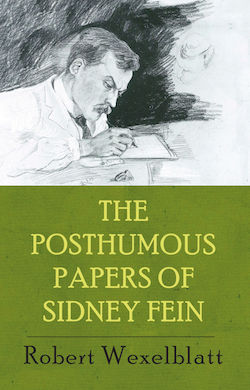From Cinderella to Kafka: The Scholarly Musings of Sidney Fein

The character of Sidney Fein came to Professor of Humanities Robert Wexelblatt after he read a book of French critical theory that left him with “an impression of parasitism and arrogance” on the part of the scholars. He processed his reaction to the book in the form of a satirical essay evaluating the career of a fictional thinker, writer, and teacher: Sidney Fein.
After first writing about Fein in 1993, Wexelblatt expected to leave the scholar behind. But he found himself writing more essays and then fiction and verse in the voice of Fein. It all culminated in The Posthumous Papers of Sidney Fein (Pelekinesis, 2018)—an 556-page collection of works by the imaginary scholar.
“At a time when I had reached an impasse in my own essay-writing, I discovered that I could write things as Fein that I couldn’t as myself,” said Wexelblatt. “I had from the first a clear sense of who Fein was, how he thought, and some of what he thought about. This was because he is enough like me to have my sympathy but different enough to surprise me.”
Wexelblatt said Fein has proved to have wide-ranging interests: “He would go from big philosophical topics like ontology to little pop-culture ones like sidekicks in the old Westerns.” Fein has written on Faulk, on idol worship, on Cinderella, on wonder, on heresy, on meaninglessness, on Kafka, on irreverence, and on mystery—to name just a few. The Posthumous Papers of Sidney Fein has thirty-five pieces, including a keynote address, short stories, poems, and essays.
Each of the posthumous papers is accompanied by notes in another voice—that of a fictional editor who interprets and even channels Fein. A third character—Fein’s daughter, Maya—emerges, too, as the prompt for some of Fein’s essays and a central character in the final piece.
Writing in the voice of Fein has been an exercise in creating a mind that is like his own, but not his own, says Wexelblatt: “Writing the Fein papers liberated me to see and say things I couldn’t as myself, and it’s also been a lot of fun. The fun is often frivolous but sometimes serious, too—once in a while, it’s both.”
The Posthumous Papers of Sidney Fein is neither the first nor the last of Wexelblatt’s experiments in literary form. Wexelblatt’s previous book, Petites Suites, emerged from a series of stories that experiment with musical and narrative form. His next book, Hsi-wei Tales, is written in the voice of a Chinese peasant boy who becomes a poet during the Sui Dynasty. It will be published in 2020.